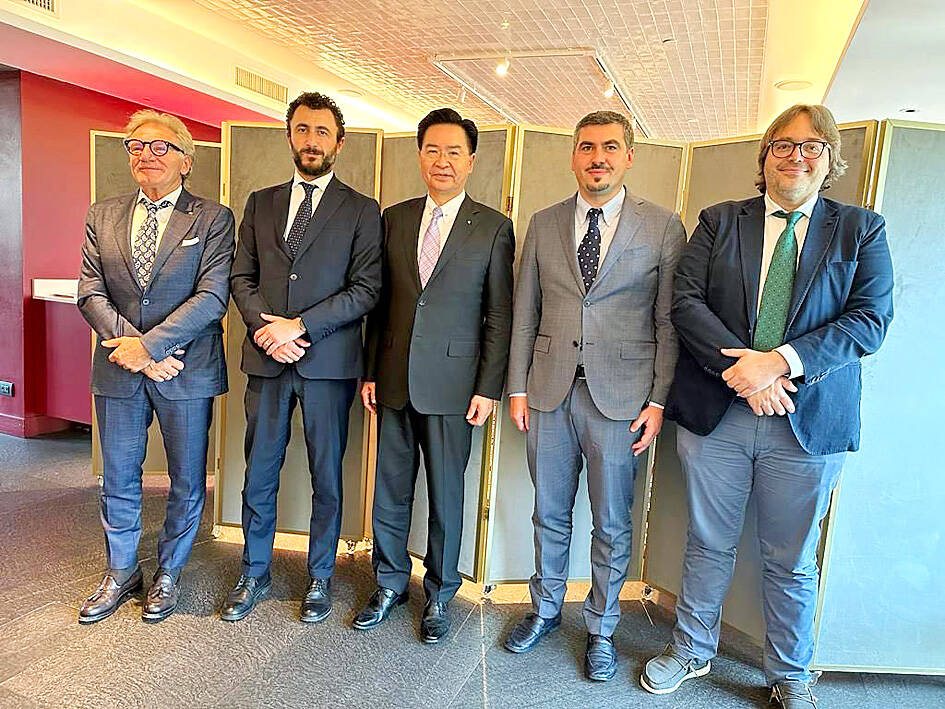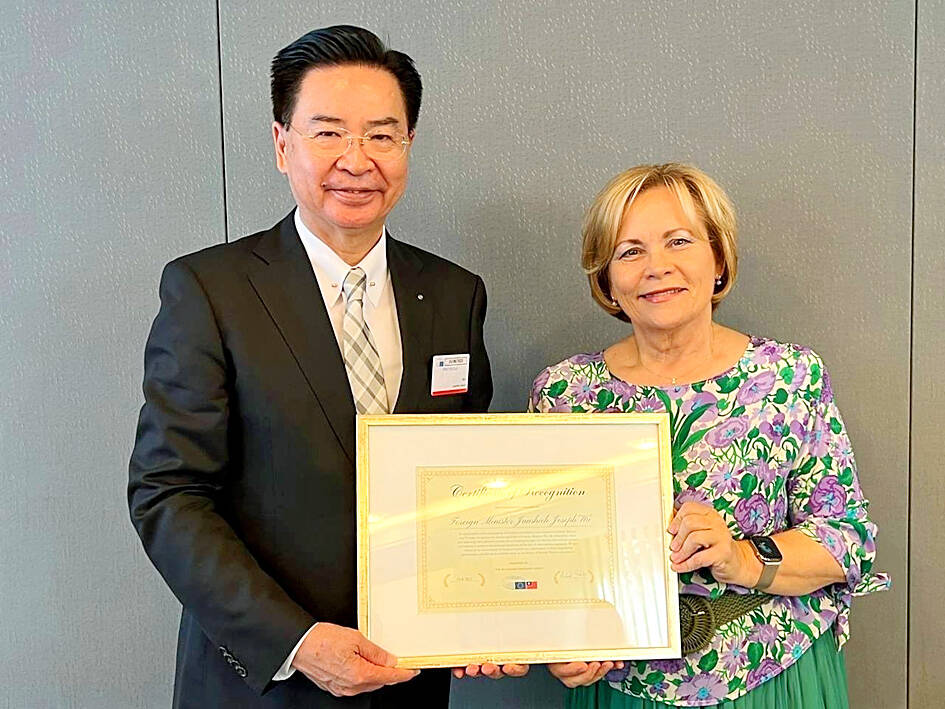Minister of Foreign Affairs Joseph Wu (吳釗燮) on Saturday met with two Italian lawmakers in an unannounced visit to Milan, local media reports said.
In separate posts on Facebook, Paolo Formentini, vice president of the Chamber of Deputies Foreign Affairs Committee, called the meeting “an honor,” while Italian lawmaker Igor Iezzi wrote that he is “always on the side of freedom.”
“It was an opportunity to reiterate that the status quo in the Taiwan Strait must remain the current one and that freedom of navigation must always be defended,” Formentini told the Italian news site Le Formiche on Saturday.

Photo: Screen grab from Igor Iezzi’s Facebook page
The visit was also important as Taiwan prepares to set up a representative office in Milan, its second in Italy, the site said.
In Taipei, the Ministry of Foreign Affairs said it had no comment on the reported meeting in Milan.
As Italy does not formally recognize the Republic of China, meetings between serving Italian lawmakers and Taiwanese officials are rare.

Photo courtesy of the Ministry of Foreign Affairs via CNA
Wu on Monday last week departed on a trip to Europe, during which he visited the Warsaw School of Economics, and met with Czech Senate President Milos Vystrcil in Prague on Tuesday and European Parliament Vice President Nicola Beer in Brussels on Friday.
Wu also met with 12 lawmakers at the European Parliament, including European Parliament Subcommittee on Security and Defence Vice Chair Rasa Jukneviciene, Belgium-Taiwan Friendship Group copresident Georges Dallemagne, Luxembourgian lawmaker Claude Wiseler and member of the British House of Lords Sal Brinton, the ministry said in a news release yesterday.
The European Parliament-Taiwan Friendship Group and the Belgium-Taiwan Friendship Group each issued a certificate of appreciation and a joint letter of appreciation to Wu in recognition of his contributions to deepening the partnership between Taiwan, and the EU and Belgium, it said.
The European lawmakers and Wu exchanged opinions on cooperation between Taiwan and Europe, the situation in the Taiwan Strait and Russia’s invasion of Ukraine, it said.
Jukneviciene, who was Lithuanian minister of defense from 2008 to 2012, was quoted by the ministry as saying that Taiwan had demonstrated its courage in safeguarding democracy and freedom in the face of China’s ambition to expand.
Enhancing Taiwan-EU relations has become the consensus of cross-party members of the European Parliament, she added.
Dallemagne called on Europe to continue its firm support for Taiwan’s freedom, democracy and international participation, the ministry said.
He presented to Wu a letter of appreciation signed by the six copresidents of the Belgium-Taiwan Friendship Group, it said.
Wiseler thanked Taiwan for donating urgently needed masks to Luxembourg and other European countries in the early stages of the COVID-19 pandemic, and affirmed Taiwan’s contribution to global public health, it said.
Brinton urged Europe to unite with Taiwan to take on challenges posed by authoritarian countries and expressed appreciation for the Taiwanese government and Taiwanese providing aid to Ukraine, it said.
Wu thanked the lawmakers for supporting cross-strait peace and stability, closer Taiwan-Europe cooperation and Taiwan’s participation in international organizations, the ministry said.
The high-level reception received by the minister underlined the importance the European Parliament attaches to Taiwan and the actions it takes to bolster cooperative partnerships, it said.
Additional reporting by CNA

US President Donald Trump yesterday announced sweeping "reciprocal tariffs" on US trading partners, including a 32 percent tax on goods from Taiwan that is set to take effect on Wednesday. At a Rose Garden event, Trump declared a 10 percent baseline tax on imports from all countries, with the White House saying it would take effect on Saturday. Countries with larger trade surpluses with the US would face higher duties beginning on Wednesday, including Taiwan (32 percent), China (34 percent), Japan (24 percent), South Korea (25 percent), Vietnam (46 percent) and Thailand (36 percent). Canada and Mexico, the two largest US trading

ACTION PLAN: Taiwan would expand procurement from the US and encourage more companies to invest in the US to deepen bilateral cooperation, Lai said The government would not impose reciprocal tariffs in retaliation against US levies, President William Lai (賴清德) said yesterday, as he announced five strategies to address the issue, including pledging to increase Taiwanese companies’ investments in the US. Lai has in the past few days met with administrative and national security officials, as well as representatives from various industries, to explore countermeasures after US President Donald Trump on Wednesday last week announced a 32 percent duty on Taiwanese imports. In a video released yesterday evening, Lai said that Taiwan would not retaliate against the US with higher tariffs and Taiwanese companies’ commitments to

‘SPECIAL CHANNEL’: Taipei’s most important tasks are to stabilize industries affected by Trump’s trade tariffs and keep negotiations with Washington open, a source said National Security Council Secretary-General Joseph Wu (吳釗燮) arrived in the US for talks with US President Donald Trump’s administration, a source familiar with the matter said on Friday. Wu was leading a delegation for a meeting known as the “special channel,” the Financial Times reported earlier. It marked Trump’s first use of the channel since returning to the White House on Jan. 20. Citing a source familiar with the matter, the Financial Times reported that Minister of Foreign Affairs Lin Chia-lung (林佳龍) was also a part of the delegation. The visit came days after China concluded war games around Taiwan and amid Trump’s

CHIP EXCEPTION: An official said that an exception for Taiwanese semiconductors would have a limited effect, as most are packaged in third nations before being sold The Executive Yuan yesterday decried US President Donald Trump’s 32 percent tariff on Taiwanese goods announced hours earlier as “unfair,” saying it would lodge a representation with Washington. The Cabinet in a statement described the pledged US tariffs, expected to take effect on Wednesday next week, as “deeply unreasonable” and “highly regrettable.” Cabinet spokeswoman Michelle Lee (李慧芝) said that the government would “lodge a solemn representation” with the US Trade Representative and continue negotiating with Washington to “ensure the interests of our nation and industries.” Trump at a news conference in Washington on Wednesday announced a 10 percent baseline tariff on most goods